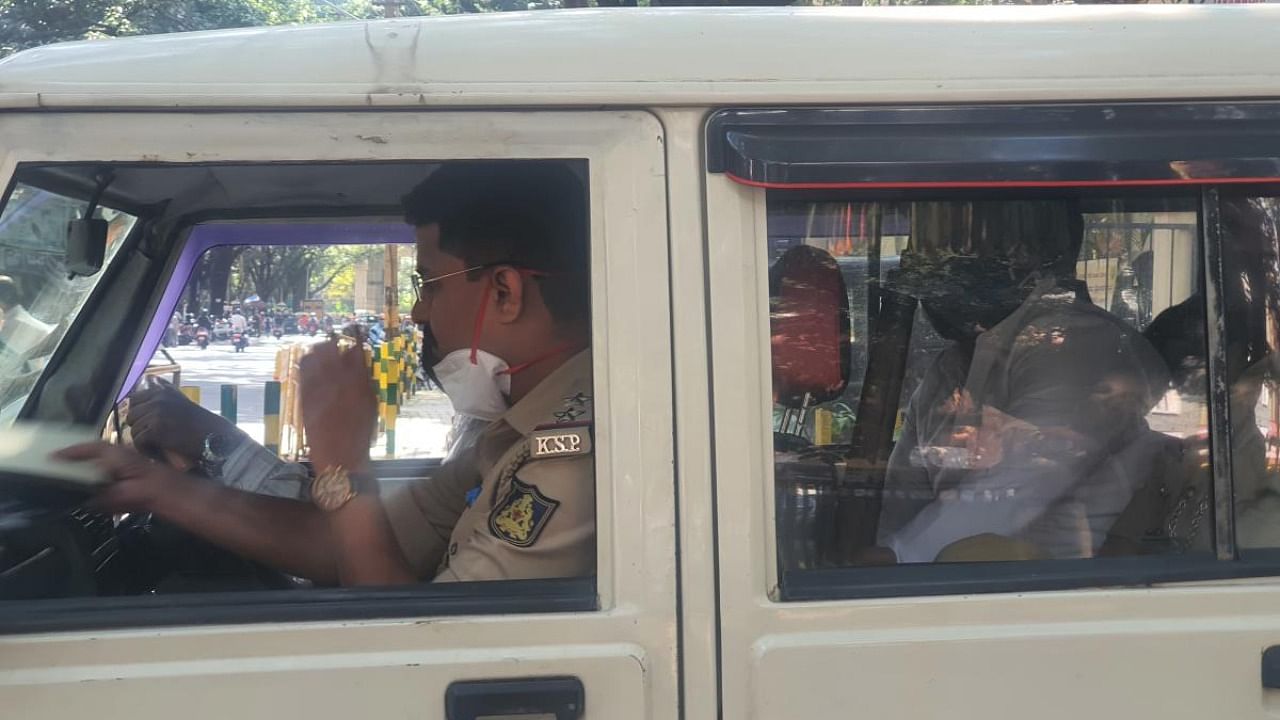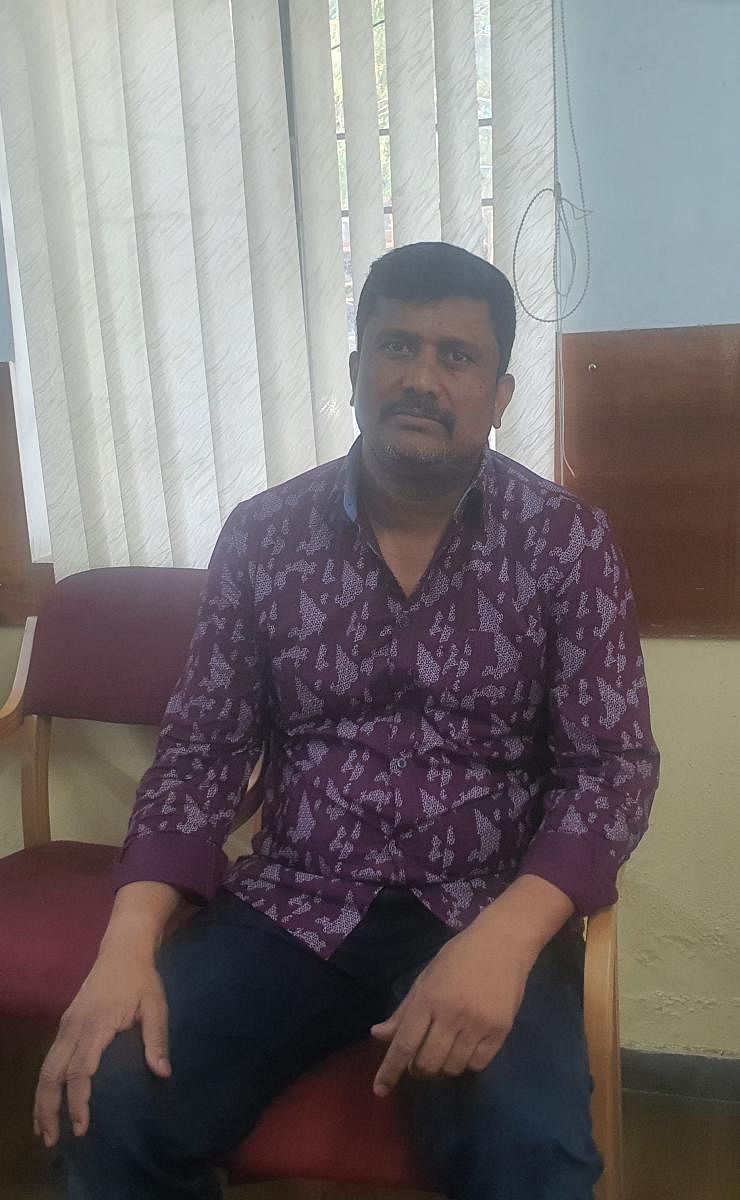

Some call him a batsman. No, Ravikumar alias Cycle Ravi doesn’t wield a willow. He gets his reputation from swinging ‘longs’, as machetes are called in the Bengaluru underworld.
Known for meticulously planned crimes, Cycle Ravi once faced 35 cases. He has since been acquitted in 25 cases, including 10 in which he was accused of murder.
Ravi had evaded arrest for three years. He surrendered on November 21, after the police threatened to get court orders to confiscate his property in Bengaluru and Karur in Tamil Nadu. He is now in judicial custody.
Ravi’s name came into the spotlight in December 24, 2020 when he was linked with another criminal called Bombay Ravi. On behalf of his Mumbai namesake, police say, Ravi allegedly hatched to kidnap and murder producers of the Kannada blockbuster ‘Roberrt’. According to the police, Bombay Ravi had tried to extort money from the producers and failed, and so had deputed his men to go after them.
From the Jayanagar police station, this reporter trailed him to a court on Nrupathunga Road, where he was to appear for a hearing. Ravi was handcuffed and escorted by six armed policemen and taken in a white Bolero. He had two policemen seated on either side and two behind him. A sub-inspector sat in the front. Ravi did not betray any signs of nerves. He was talking casually to the policemen.
At the court, before he was taken in, the reporter got to speak to him. “How did you evade arrest for so long?” the reporter asked, without much ado.
Ravi is six feet tall, and well built. Dressed in a clean white shirt and denim trousers, he wears matching slip-on sandals. He hails from Tamil Nadu, and I ask him which language he is comfortable speaking in. “Kannada,” he says, without a pause. “I have my roots in Tamil Nadu in Karur, but I was born and brought up here in Karnataka,” he says.
In police records, 45-year-old Ravi is listed as a ‘A’ rowdy sheeter in Yelahanka and Hanumanthnagar police stations in Bengaluru and ‘B’ rowdy sheeter in 20 other police stations.
That means he is accused in 35 cases but has never ever been convicted. A resident of Manganahalli near Kodigehalli in Yeshwanthpur, he got his name from his father’s trade. His father ran a cycle shop and Ravi used to help him at the shop after college hours.
His first crime
He was 19 when one of his friend was stabbed fatally in a fight between two gangs involving the issue of lottery tickets. In a bid to avenge the killing, Ravi stabbed the alleged killer, who died soon after. This was in 1997, and he was accused of murder for the first time.
“I got into crime by mistake and now after 25 years, I just want to lead a normal life with my family. My name is being repeatedly dragged into cases I am not involved in,” he says.
He hints he is used for crime by others: “Powerful people want to keep me in the business of killing, extortion and settling land deals.”
Ravi is at ease sharing details about his life, but is cautious when it comes to talking about his methods, and his associates. “All I can say is that nobody can be trusted and I have my own ways,” he says.
He claims he has served jail terms for crimes committed before 2010, and has not been involved in any crime after that.
“I was in and out of jail. But when I came out, thinking I had served all sentences, I was again sent to jail when Babu from a rival gang was murdered. I was dragged to jail on April 28, 2010. After three years, when I came out in 2013, I was again charged with 399 and 402.” The reference is to sections of the Indian Penal Code dealing with preparation to commit dacoity. Ravi is familiar with some aspects of the law.
Shot at by the police
Many people want him eliminated, he says. He faced a murder attempt in 2018, when he was in Bengaluru. “It was a narrow escape and I just about managed to survive. A bullet pierced through my leg and just missed my kidney,” he says.
Ravi says people from within his gang betrayed him. “They went against me. It is true that I have committed some crimes, but none of it was for myself. It was all linked to other cases and I was just the executioner,” he says.
Throughout the conversation, he is calm. His face gives nothing away.
Shamed by TV news
By his own admission, Ravi began to change after his 14-year-old daughter saw news on TV about a shooting in 2010, and asked him whether all this was true. “My family, especially my children, didn’t know what my job was until then. The media went overboard talking about me. My children were ashamed and I thought I should start leading a normal life,” he says.
Ravi’s son, studying law, was also dragged to the police station. “This is when I realised my family was as much a target as I was. Now that I have made a name and earned enough money, I want to stop,” he says.
Smart tactics
Police say Ravi is one of the smarter criminals they have had to track. His location was always difficult to trace. He used multiple SIM cards and constantly changed his vehicles when he had to travel. A sleuth says Ravi even changes his shirts often.
“Yes. These small things make a big difference. If I am not guilty of something, why should I fall into a trap laid by the police?” Ravi says.
He uses multiple phones and communicates only with a close circle. “Only my wife has my numbers. I don’t share them with anybody else. I am not afraid of being caught, but I don’t want my name to be dragged into cases I am not involved in,” he explains.
Police say Ravi uses code language to communicate his location to people close to him. He moves around only with trusted people, and doesn’t let anybody new into his circle.
Lawyer’s evaluation
In court, this reporter met Ravi’s lawyer Ram Singh K defending him since 2016. He agrees to interact only after a word from Ravi.
Singh is more guarded than Ravi. “I don’t know his history, but after 2016 Ravi has not been involved in any case. Whatever cases are slapped against him now are false,” he says.
The lawyer says that the police have framed Ravi in a narcotics case. “He doesn’t even allow any drug addicts near him. How can he smuggle ganja?” Singh says. The proceedings are set to begin. Ravi is taken in and the lawyer hurries away.
The police say Ravi should remain behind bars, even though he has been acquitted in big cases.
Harish Pandey, DCP South, Bengaluru, says active gang wars have come down in Bengaluru and only a handful of rowdies, such as Cycle Ravi and Silent Sunila, are calling the shots.
“Ravi has been lying low since 2010 but why should we allow him to remain free? The intention of the criminal justice system is to provide a fair trial, and he needs to be inside for us to find witnesses willing to testify,” Pandey says.
Criminals like Ravi get away because witnesses turn hostile or are threatened into silence, he observes. “They create fear. Even if he is not directly involved in a criminal act, Ravi sanctions the act. He has now turned to smuggling drugs, a more lucrative business,” Pandey says.
The charge Ravi now faces is that he procured ganja from Tamil Nadu and told his associates Pradeep and Beeraiah to sell it at small gambling dens. He also asked them to set up ‘addas’ near colleges and bars. The proceeds, police say, was being transferred to Ravi through ATM deposits. The investigators say they are pursuing the five remaining cases seriously.
Rowdies are like political parties: they get into alliances, and also break them, the officer says. “They stay together as long as their common interests are met. But once there is a clash, they part ways and won’t even hesitate to kill members from their own gang,” he says.
Strategic arrest
In recent years, according to Harish Pandey, Ravi interfered in civil disputes, and settled them in favour of whoever paid him off.
The police have evolved a new strategy to arrest criminals: going after their properties. “A rowdy may have many benami properties, but if he cannot save them, it sends out a strong message that he is not so invincible after all,” adds Pandey.
Who is Ravi?
Ravi did his schooling at Sri Raja Rajeshwari Public School, Bengaluru, where he studied till the seventh standard. He is Tamil, but was born and brought up in Bengaluru, and is fluent in written and spoken Kannada. His father Muniyappa, a cycle shop owner, died in 2006. Ravi has two older brothers and two wives, Ramya and Komala. He has two children from his first wife Ramya, a tailor. His son is studying law in Tamil Nadu and daughter is a ninth standard student. His second wife Komala runs a travel agency. He has two sons from her, both studying in college. They live in Yelahanka.
Cell to monitor cases
The south division of the Bengaluru police has set up a cell to speed up court procedures.
“The longer a case takes, the more the witnesses become hostile,” explains Harish Pandey. The cell, set up in July 2021, monitors all criminal cases.
The south division has 684 criminal cases at the moment. “A sub-inspector and three constables now keep track of the rowdies who have missed their court appearances,” Pandey says.
The team also tracks who has been given exemption from attendance by the courts, and which witnesses have gone hostile.
Why can’t Ravi be trusted?
The police consider Ravi cunning. “He changes loyalties fast. He will do anything to retain his territory. He doesn’t protect his gang either, which is why many have turned against him,” says an investigator.
Nexus with politics, real estate
A retired police officer credited with curbing the activities of dons such as Kotwal Ramachandra, Agni Sridhar, Tanveer, Bachchan and Oil Kumar in the early ‘80s, says rowdies are now hand in glove with politicians and real estate developers, both of whom use them to grab land.
“The rowdies first create fake documents in the name of a person from the Dalit community. When the original land owner comes, they threaten to slap a caste atrocity case against him. In some cases, they get protection from the police, too,” says the officer.
Watch latest videos by DH here: